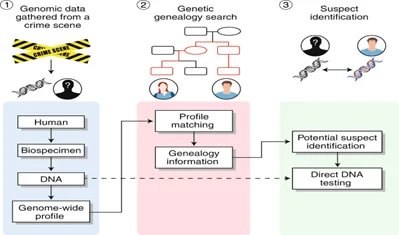Governance, Science and Technology
Context: Recently, the Supreme Court (SC) has held in a judgment that children cannot be subjected to DNA tests in each and every case to establish proof of infidelity.
About Genetic Privacy:

- It is a term that seeks to prevent a third party from using a person’s genetic data without his permission.
- A person’s genes are the blueprint of his or her physical or biological being, personal life and information about the future, present and history.
- Other information that can be abstracted: alcoholism, depression, aggressiveness, sexual orientation, mental productivity etc.
- When a person’s genetic data is used for testing, medical purposes, or other purposes, his privacy should be protected.
- Genetic data is made up of a person’s deoxyribonucleic acid (DNA) and chromosomes.
- DNA sample sources: hair, teeth, blood etc.
SC rulings on genetic information:
- Genetic information is personal and intimate.
- Thus, a child’s genetic information is part of his fundamental right to privacy.
- Children have the right to not have their legitimacy questioned before a court of law.
- DNA tests would harm the reputation and dignity of the mother.
- The children should not to be subjected to forensic/DNA testing during the divorce proceedings.
- Family courts should direct for a DNA test only in the situations where it is a last resort and in the interest of justice.
Status of Genetic Privacy in India:
- In 2018, The Delhi High Court stated that discrimination in health insurance against people based on their genetic origin, in the absence of genetic test is unconstitutional.
- Genetic discrimination breaches Article 14, which guarantees equality before the law.
- In Justice KS Puttaswamy (Retd.) & Anr. v. Union of India, SC stated that the Right to Privacy is a fundamental Right under Article 21.
Genetic discrimination in other countries:
- In 2008, the United States had passed the Genetic Information Non-discrimination Act (GINA), to protects people from genetic discrimination in health care and jobs.
- Council of Europe has adopted the Guidelines on the use of genetic knowledge for insurance purposes.
- Under Canada’s Genetic Non-discrimination Act, it is illegal for insurers or employers to request DNA testing or findings.
Advantages of genetic information:
- Genetic information may disclose information about a disease, illness, or a person’s health status.
- It can make a person more aware of his or her health.
- A person can learn about his ancestors and distant relatives.
- One’s data can be used in medical research.
- If a person learns about his illness early on, he would be able to take more preventative steps to treat it.
Disadvantages of genetic Information:
- Based on the profile available in the domain, genetic evidence can be fabricated in any crime scene through engineered DNA samples not taken from a real individual.
- Data such as person’s personal life, health, family members, and other private information when assessed by a third party can be misused.
- If such information is revealed, it can negatively impact individuals lives, such as discrimination from employers, insurance providers, the government, and others.
UN Convention on the Rights of the Child:
- It is a treaty adopted by the United Nations General Assembly in 1989.
- It recognises a child as every human being under 18 years old.
- It is an international agreement that is legally binding on the members.
- It sets out the civil, political, economic, social and cultural rights of every child, regardless of their race, religion or abilities.
- It includes rights such as Right to Education, Right to Rest and Leisure, Right to Protection from Mental or Physical Abuse including Rape and Sexual Exploitation.
- It has been ratified by all members of the UN except for the United States.
- It is the most widely ratified human rights treaty in the history of the world.
Way Forward:
Thus with improvements in encryption, safe storage, and data transfer protocols, there may be potential to improve privacy protections technologically. From an ethical standpoint, it will be crucial to keep educating the public about the benefits and dangers of genetic testing and data sharing. It may entail activities to provide fair access to genetic testing and benefits as well as efforts to support transparency, openness, and accountability around the collection, use, and sharing of genetic data.
Source: The Hindu












